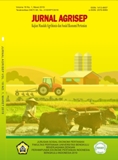Main Article Content
Abstract
Keywords
Article Details
Copyright (c) 2019 sonitia verawati sinaga, Harianto Harianto, Suharno Suharno

This work is licensed under a Creative Commons Attribution-ShareAlike 4.0 International License.
Authors who publish with this journal agree with the following terms:
- Authors retain copyright and grant the journal right of first publication with the work simultaneously licensed under a Creative Commons Attribution-ShareAlike 4.0 International License that allows others to share the work with an acknowledgment of the work's authorship and initial publication in this journal.
- Authors are able to enter into separate, additional contractual arrangements for the non-exclusive distribution of the journal's published version of the work (e.g., post it to an institutional repository or publish it in a book), with an acknowledgment of its initial publication in this journal.
- Authors are permitted and encouraged to post their work online (e.g., in institutional repositories or on their website) prior to and during the submission process, as it can lead to productive exchanges, as well as earlier and greater citation of published work (See The Effect of Open Access).
- This work is licensed under a Creative Commons Attribution-ShareAlike 4.0 International License.
References
- Ardiyani, Erdiansyah. 2012. Sertifikasi Kopi Berkelanjutan di Indonesia. Jember, Indonesia. Warta Pusat Penelitian Kakao dan Kopi di Indonesia.
- Badan Pusat Statistik. 2016. Statistik Kopi. Jakarta, Indonesia: Badan Pusat Statistik.
- Badan Pusat Statistik. 2017. Luas Tanaman dan Produksi Kopi Arabika Tanaman Perkebunan Rakyat menurut Kabupaten/Kota 2017. Tersedia pada https://sumut.bps.go.id
- Conservation International. 2012. C.A.F.E. Practices Results Assessment Fiscal Years 2011-2012. Tersedia pada http://www.conservation.org/publications DeFries, R.S., Fanzo,
- J., Mondal, P., Remans, R., Wood, S.A. 2017. Is voluntary certification of tropical agricultural commodities achieving sustainability goals for small-scale producers? a review of the evidence. Environ Research Letter. 12(3):124-146.
- Haggar, J., Soto, G., Casanoves, F., & Virginio, E.d.M. 2017. Environmental Economic Benefits and Trade-offs on Sustainably Certified Coffee Farms. Ecological Indicators, 79(4), 330–337. doi:
- 1016/j.ecolind.2017.04.023
- Hosmer, D.W., and Lemeshow, S. 2000. Applied Logistic Regression . New Jersey, United states: John Wiley & Sns, Inc.
- Nugroho, P., Firdaus, M., Asmara, A. 2018. Pengaruh Standar Keamanan Pangan terhadap Ekspor Produk Biofarmaka Indonesia. Jurnal Ekonomi dan Kebijakan Pembangunan, 6(1), 41-57.
- Purba, O.M. , Toekidjo, J. P. 2013. Produktivitas Kopi Arabika (Coffea arabica L.) Rakyat di Kecamatan Raya Kabupaten Simalungun. Vegetalika, 1(2), 67-77.
- Rosenbaum, P.R., Rubin, D.B. 1984. Reducing Bias in Observational Studies Using Subclassification on the Propensity Score. Journal of the American Statistical Association, 79 (387), 516-524.
- Saragih, J.R. (2016). Produksi Kopi Arabika Spesialti Sumatera Utara : Analisis Sosial Ekonomi, Ekologi, dan Kebijakan Pemerintah Daerah. www.usi.ac.id/karya ilmiah dosen.
- Sepulveda, W.S., Chekmam, L., Maza, M.T., Mancilla, N.O. 2016. Consumers' preference for the origin and quality attributes associated with production of specialty coffees: Results from a cross-cultural study. Food Research International, 89, 997-1003. doi: 10.1016/j.foodres.2016.03.039
- Vellema, W., Casanova, A.B., Gonzalez, C, D’Haese, M. 2015. The Effect of Specialty Coffee Certification on Household Livelihood Strategies and Specialisation. Food Policy, 57 (9),13-25. doi: 10.1016/j.foodpol.2015.07.003
References
Ardiyani, Erdiansyah. 2012. Sertifikasi Kopi Berkelanjutan di Indonesia. Jember, Indonesia. Warta Pusat Penelitian Kakao dan Kopi di Indonesia.
Badan Pusat Statistik. 2016. Statistik Kopi. Jakarta, Indonesia: Badan Pusat Statistik.
Badan Pusat Statistik. 2017. Luas Tanaman dan Produksi Kopi Arabika Tanaman Perkebunan Rakyat menurut Kabupaten/Kota 2017. Tersedia pada https://sumut.bps.go.id
Conservation International. 2012. C.A.F.E. Practices Results Assessment Fiscal Years 2011-2012. Tersedia pada http://www.conservation.org/publications DeFries, R.S., Fanzo,
J., Mondal, P., Remans, R., Wood, S.A. 2017. Is voluntary certification of tropical agricultural commodities achieving sustainability goals for small-scale producers? a review of the evidence. Environ Research Letter. 12(3):124-146.
Haggar, J., Soto, G., Casanoves, F., & Virginio, E.d.M. 2017. Environmental Economic Benefits and Trade-offs on Sustainably Certified Coffee Farms. Ecological Indicators, 79(4), 330–337. doi:
1016/j.ecolind.2017.04.023
Hosmer, D.W., and Lemeshow, S. 2000. Applied Logistic Regression . New Jersey, United states: John Wiley & Sns, Inc.
Nugroho, P., Firdaus, M., Asmara, A. 2018. Pengaruh Standar Keamanan Pangan terhadap Ekspor Produk Biofarmaka Indonesia. Jurnal Ekonomi dan Kebijakan Pembangunan, 6(1), 41-57.
Purba, O.M. , Toekidjo, J. P. 2013. Produktivitas Kopi Arabika (Coffea arabica L.) Rakyat di Kecamatan Raya Kabupaten Simalungun. Vegetalika, 1(2), 67-77.
Rosenbaum, P.R., Rubin, D.B. 1984. Reducing Bias in Observational Studies Using Subclassification on the Propensity Score. Journal of the American Statistical Association, 79 (387), 516-524.
Saragih, J.R. (2016). Produksi Kopi Arabika Spesialti Sumatera Utara : Analisis Sosial Ekonomi, Ekologi, dan Kebijakan Pemerintah Daerah. www.usi.ac.id/karya ilmiah dosen.
Sepulveda, W.S., Chekmam, L., Maza, M.T., Mancilla, N.O. 2016. Consumers' preference for the origin and quality attributes associated with production of specialty coffees: Results from a cross-cultural study. Food Research International, 89, 997-1003. doi: 10.1016/j.foodres.2016.03.039
Vellema, W., Casanova, A.B., Gonzalez, C, D’Haese, M. 2015. The Effect of Specialty Coffee Certification on Household Livelihood Strategies and Specialisation. Food Policy, 57 (9),13-25. doi: 10.1016/j.foodpol.2015.07.003
